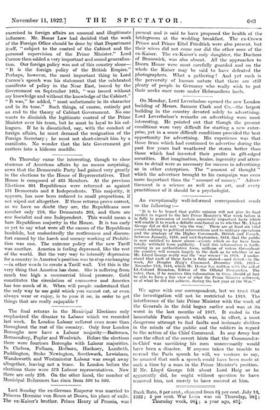We agree with our correspondent, but we trust that the
investigation will not be restricted to 1913. The interference of the late Prime Minister with the work of the Generals in the field began earlier and was at its worst in the last months of 1917. It ended in the lamentable Paris speech which was, in effect, a most dangerous attempt to find faults and insinuate dislikes in the minds of the public and the soldiers in regard to the action of the Chief Command. In any Army but ours the effect of the covert hints that the Commander- in-Chief was sacrificing his men unnecessarily would have been a disaster. If anyone takes the trouble to re-read the Paris speech he will, we venture to say, be amazed that such a speech could have been made at such a time by a man in the Prime Minister's position. If Mr. Lloyd George felt about Lord Haig as he apparently did, he ought without question to have removed him, not merely to have sneered at him.


























































 Previous page
Previous page